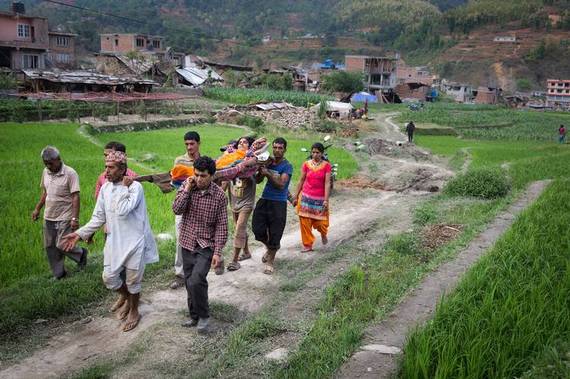
Oh and if I had a brain,
Oh and if I had a brain,
I'd be cold as a stone and rich as a fool
That turned all those good hearts away.
- Cherry Ghost, People Help the People

Source: The Wall Street Journal
On the 24th of August, 79 AD, the people of Misenum saw Mount Vesuvius erupt on the other side of the Bay of Naples. They watched it bury the city of Pompeii, claiming two thousand unknown lives, then most went on with their own for many more years, before dying safely in their beds. Only one man set sail for the burning city to save two of his friends. We know his name was Pliny the Elder, and he died in the attempt.
Disasters are gender, race, religion, age and color blind, and seconds before they striek, all humans are only humans, just a sea of unknown names. Until a bomb goes off, an earthquake strikes, then two flows of people appear; those running away, for their lives, and those running to the blast.
Those running from are propelled by the blast, kicked in the heels by the shock. Covered in dust, blood, momentarily deaf, some are missing limbs and clothes. Their flight is an instinctive one to survive, anywhere far from here. A frantic race to that reality, minutes ago, where they were reading the paper, riding the metro, stirring sugar in their tea.
Those running to are harder to spot in a stampede toward the exit. The search and rescue teams, the ambulance drivers, the people from a nearby village, the volunteers, whose only common denominator is that they are heading the wrong way. Carrying supplies across narrow, wiped out roads, to villages cars cannot reach, pulling at the rubble with their hands to reach unknown lives and names underneath.
The fishermen who rescued capsized migrant boats, the interpreters who waited on the shore. The families that shared food and clothes, blankets and couches with strangers. The neighbors who carried a girl on their shoulders, to a hospital a mountain and hour away. The firefighter who apologized to an eight-year-old girl for reaching her too late.
These irrational, unnatural people, whose actions make no sense. For in real life good Samaritans are fools who get caught in crossfire and killed. Earthquakes come with aftershocks, explosions often come in twos. Real life heroism comes at a price, and we each only have one life.
Thousands of years after Pliny died in Pompeii, we clearly have not evolved. Natural law dictates survival of the fittest, but we still run into burning homes. Some people still risk their lives, not knowing whom they are risking them for. Nameless, faceless, unidentified unknowns; someone else's loved ones.
But that's just it: there are no unknowns. Each of them once had a name. And habits and dreams, a date of birth, a favorite birthday cake. Before the storm, the earthquake, the flood, the fire, each unknown had a life. And maybe a song in their head and someone, somewhere, waiting for them to come home.
We are each no more or less significant than the person across us on the bus. That someone else's loved one under the rubble could just as easily have been ours. And if our humanity is all we have in common, then that is more than enough. Yes I would come back for an unknown life; I'd want someone to come back for mine.
This week an earthquake shook Italy, migrants capsized off the Libyan coast. More bombs fell on the Middle East, more people fled their homes. But as the media reports on madness and horror, I'd like to point the cameras the other way, to the rescuers running to these scenes to save unknown lives and names.
They only appear when needed and, when the crisis is done, go quietly back to the paper they were reading, the metro they were riding, the sugar they were stirring in their tea. Before they do, I want to thank these irrational, unnatural people whose actions make no sense. One in particular, the most selfless man I know, who swam back for me three years ago.
People help the people,
And if you're homesick,
Give me your hand and I'll hold it.
People help the people,
Nothing will drag you down.
For more posts by this author, visit Aristotle at Afternoon Tea.
